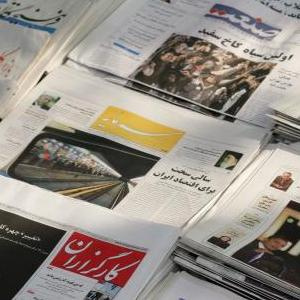Tehran’s Daily Newspaper Review

A chain of high-profile violent crimes in Tehran –the murderous stabbing of a young female student in a crowded district in northeastern Tehran, the murder of Iran’s strongest man by three youngsters following a verbal fight, and the gory assault on a young cleric after he tried to stop harassment of three young women- has raised many criticisms of the Judiciary and the police forces. Reporting “Citizens’ concern about the lack of legal provisions to preclude street fights,” Iran called for “No hesitation in passing the act on banning the carrying of cold weapons.” In his meeting with cultural centers of mosques, Mahmoud Ahmadinejad reiterated his subliminal remarks, saying that “The Iranian nation and the Islamic Republic loves all countries and wants dignity for all humanity.” He also added that “Friendship with Iran is in benefit of all regional states.” In Iran’s editorial, Ali-Akbar Javanfekr criticizes the reactions to his Monday editorial and its coverage with the headline, “Javanfekr threatens the Judiciary” by “the so-called Principlist media.”
“Zionist Military Attack Ship Carrying West’s Humanitarian Aid to Gaza” was Jomhouri-ye Eslami’s top headline, set beside “Germany agrees to sell sixth nuclear submarine to Israel” and “Hollywood producer advanced Israel’s nuclear program.” Ali Larijani called for serious penalizing of thugs, referring to the recent violent cases in Tehran. Jomhouri-e Eslami’s editorial was a sequel to Tuesday’s piece titled “Sepah and politics”. Based on Ayatollah Khomeini’s statements, the author argues that despite the need to have political awareness, the military should avoid direct engagement in politics and siding with specific political parties.
Kayhan’s top headline also concerned the violence in Tehran: “Security and judicial officials summoned; Majles’ solemn warning: Show no mercy to thugs”. Kayhan’s editorial, “Backstage of a project”, analyzed the appointment of former Maldives FM Ahmed Shaheed as UN human rights rapporteur in Iran, dubbing it “a political project” and a shift from pressure on Iran’s nuclear program; an effort to tarnish Iran’s image amid the “Islamic uprising” in the Middle East, and a reaction to Imperialism’s failure to achieve its goals after the 2009 presidential election.
One day after the speaker of the Guardian Council stated that his office received no edict on annulment of the Reformist parties Islamic Participation Front and Mojahedin of the Islamic Revolution, Resalat ran a detailed piece on the judicial process which led to the annulment of these two progressive Reformist parties in the wake of 2009 post-election unrest in Iran. Resalat’s top headline was an atypical remark by Minister of Finance Shamsoddin Hosseini: “Oil trade should be released from the government’s monopoly.” The newspaper’s editorial was written by Heshmatollah Falahatpisheh, member of the parliament, on the importance of the upcoming conference of Muslim countries in Tehran in support of the Palestinian cause.
Shargh’s top headline was “Insecurity rankles the Majles”, pointing to Ali Larijani’s critical remarks and the summoning of the head of the police forces and speaker of the Judiciary to Majles to answer MPs’ questions about the cause of the recent wave of shocking crimes. Ali Larijani leveled his criticism at the government. The Speaker of the Parliament stated that people’s initial concern is “security and prosperity, not strife in political line-ups for the elections, or unrefined economic and cultural plans improvised every now and then, and not clear which of the people’s pains they can relieve.” Shargh’s editorial focused on Nigeria’s takeover of Iran’s position in OPEC as the second largest oil exporter, and Saudi Arabia’s plans to undermine Iran’s situation in the market.
“Whistleblower dead”. Extraordinarily large font and a photo of Sean Hoare decorated Vatan-e Emrooz’ front page. Israel’s raid on another Gaza-bound aid flotilla, the recovery of the young cleric seriously wounded during his effort to rescue three young women from harassment, and Al-Khalifah’s plan to change the demographic composition of Shi’a-majority Bahrain were other front page headlines of the newspaper.
* Note: Vatan-e Emrooz does not publish on Thursdays.
Trouble with understanding some terms? Check our Glossary of Iranian Political Terms.
Briefing
Hamshahri (Citizen) is the official daily newspaper of Tehran's Municipality. Its general directions in politics, culture and economy are determined by the mayor of Tehran, currently Mohammad Baqer Qalibaf.
Iran is the official organ of the administration.
Jomhouri-ye Eslami (The Islamic Republic) was known as the official organ of the Party of the Islamic Republic, founded in 1979 and disbanded in 1987. Currently, it is an open critique of Mahmoud Ahmadinejad's policies and is known to be a mouthpiece of Akbar Hashemi Rafsanjani.
Kayhan (Universe) is a hard-line conservative newspaper. Its editor-in-chief –currently Hossein Shari’atmadari- is appointed by Iran's Supreme Leader. Shari’atmadari’s editorials often spark off controversy and debate inside Iranian political circles.
Resalat (Mission) belongs to the moderate wing of the principlist camp. Resalat’s best known analyst is Amir Mohebbian, its political editor.
Shargh (East) is a moderate reformist newspaper. It was the most popular and influential reformist newspaper in its first period of publication which lasted from August 2003 until September 2006.
Tehran-e Emrooz (Tehran Today) is a ‘principlist reformist’ newspaper, connected to Mohammad Baqer Qalibaf.

